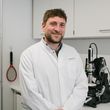
Climate change is no longer a future threat – it’s a present-day health crisis. Rising temperatures, shifting weather patterns, and increasing air pollution are already affecting how and where people live, work, and stay healthy. While no one is immune, vulnerable populations – especially those with limited access to healthcare and fewer resources to adapt – are most at risk. By 2050, an estimated six billion people will be at risk of climate-related diseases such as malaria and schistosomiasis.
At Swiss TPH, the connection between environment and health has long been part of our work. But with the growing urgency of climate-related health risks, we’ve made it a strategic priority for the years ahead.
Our researchers are asking urgent questions – and answering them with science, data, and collaboration. How do extreme temperatures impact healthcare systems? How can we track pesticide exposure in farming communities? What role can urban green spaces play in preventing disease? How are climate patterns shifting disease risks across regions?
The answers lie not only in the evidence – but in the people behind it.
Across departments and disciplines, Swiss TPH researchers are working to understand and tackle the complex links between a warming planet and human health. From environmental epidemiologists and mathematical modellers to experts in vector-borne diseases, urban planning and pesticide exposure, they are translating science into action.
Their work is grounded in collaboration – across sectors, borders and communities – because the solutions we need are as interconnected as the challenges we face. By generating policy-relevant evidence, co-developing interventions with partners, and empowering the next generation of scientists, they are not only responding to today’s crisis, but helping shape a healthier, more just and climate-resilient tomorrow.
What motivates you to work on climate change and health?

“From a professional standpoint, working in urban public health offers many opportunities to engage in interdisciplinary and cross-sector collaborations, driving science into real-world impact, which is something I am passionate about. On a personal level, I am fully aware that those of us living in wealthy countries bear the greatest responsibility for the climate crisis. This awareness drives me to actively contribute to urgent solutions that protect and promote health and well-being in the face of global climate change.”
Mirko Winkler
is Head of the Urban Public Health unit at Swiss TPH. His research focuses on the interaction between environmental change, social change, sustainable development and public health.
What motivates you to work on climate change and health?

“I really enjoy the scientific challenge and working with “big data”, but I’m also driven by my ethical concerns about the future we’re building for the next generations. Framing climate change through the lens of human health makes it more relatable for people and politicians – and the co-benefits of climate action have a huge potential to cascade into sustainability and nature protection. As societies increasingly experience the effects of climate change and start to understand the risks, this awareness can shape political priorities, scientific research and technological development – which I find very motivating.”
Alonso Bussalleu
is a PhD student in the Environmental Exposures and Health unit at Swiss TPH. His research focuses on modelling high-resolution daily temperature across Europe.
Why is it important that we research climate change and health?

“My research focuses on environmental exposures like air pollution, pollen, and urban green spaces – factors that are all interconnected. Trees and green areas are important to cool our cities and provide shade, but smart planning is essential so that we get to enjoy co-benefits like increased biodiversity, lower air pollution and more opportunities for physical activity, while avoiding highly allergenic pollen. Investing in climate-resilient public spaces and making it easier for people to walk, cycle, or use public transport are great forms of health prevention. If we do it right, the health benefits are bigger and more equitable than any treatment you can get at a doctor’s office.”
Marloes Eeftens
leads the Sensoring and Environment Epidemiology group at Swiss TPH. Her research explores how environmental exposures affect human health.
What is the biggest challenge in addressing climate related health risks today?

“As a public health institute, we have to ask ourselves: how can climate and health research lead to real change? I strongly believe our greatest impact is through policy-relevant data, such as informing urban planners on how to design healthier cities. With the evidence we produce, coupled with strong science communication, we can support people shifting towards more sustainable lifestyles. Working closely with study participants through cohort studies brings us closer to this goal – and gives me hope for a healthier, more sustainable future.”
Nicole Probst-Hensch
is Head of the Department of Epidemiology and Public Health at Swiss TPH. Her research focuses on chronic diseases, with expertise in environmental and molecular epidemiology, cohort studies, and exposome science.
What is your research about, and how does it relate to climate change and health?

“Rising temperatures may increase pest infestations and lead to greater pesticide use, increasing exposure risks for farm workers, their children, and nearby communities. My research focuses specifically on how pesticide exposure factors including both behavioural and environmental affect the reproductive health of children. By understanding the pathways and impacts of the pesticide exposure, we can better address environmental health risks that are indirectly fuelled by climate change.”
Regina Molomo
is a PhD student in the Chronic Disease Epidemiology unit. Her research focuses on pesticide exposure among children and adolescents in South Africa.
What gives you hope for the future?

“There is growing awareness of the health risks posed by extreme heat and the urgent need for action. Initiatives are emerging to address these risks, but the pace of implementing adaptation and mitigation measures is still too slow. Rather than relying on hope alone, I believe we must find a way to drive change by working across disciplines and with stakeholders to build shared understanding, shape common visions, and co-develop solutions that protect health, reduce inequalities, and respond to one of the most pressing challenges of our time.”
Martina Ragettli
is project leader in the Environmental Exposures and Health unit. Her current research focuses on the health impacts of climate-related environmental exposures such as heat, air pollution or green space and policy-relevant ways to minimise them.
What gives you hope for the future?

“Despite the challenges – like misinformation, siloed efforts, and declining funding – there is hope. Communities are becoming more aware of the health impacts posed by climate change, and governments are increasingly introducing climate related policies. When we combine indigenous knowledge with government actions, we can create climate-resilient health systems. The growing number of young researchers, greater public engagement, and a shift in global conversations highlighting climate change as a health issue give me confidence that together, we’re moving in the right direction.”
Bryan Nyawanda
is a post-doctoral scientific collaborator in the Biostatistics unit at Swiss TPH. His interests are in Bayesian and frequentist statistics, machine learning, epidemiology and disease modelling.
What gives you hope for the future?

“Climate change is shifting mosquito habitats and expanding the risk of disease to new regions – but what gives me hope is the steady progress in research, innovation, and collaboration. Advances in mosquito control strategies, such as genetic modification, improved insecticides, and biological control methods, are providing new tools to combat vector-borne diseases more effectively. Many mosquito borne diseases are preventable, and with ongoing scientific advancements and continued global commitment, I believe we can reduce their burden and improve global health.”
Tobias Suter
leads the Arthropod Testing Facility at Swiss TPH. His research focuses on evaluating tools and strategies to control disease-transmitting mosquitoes.